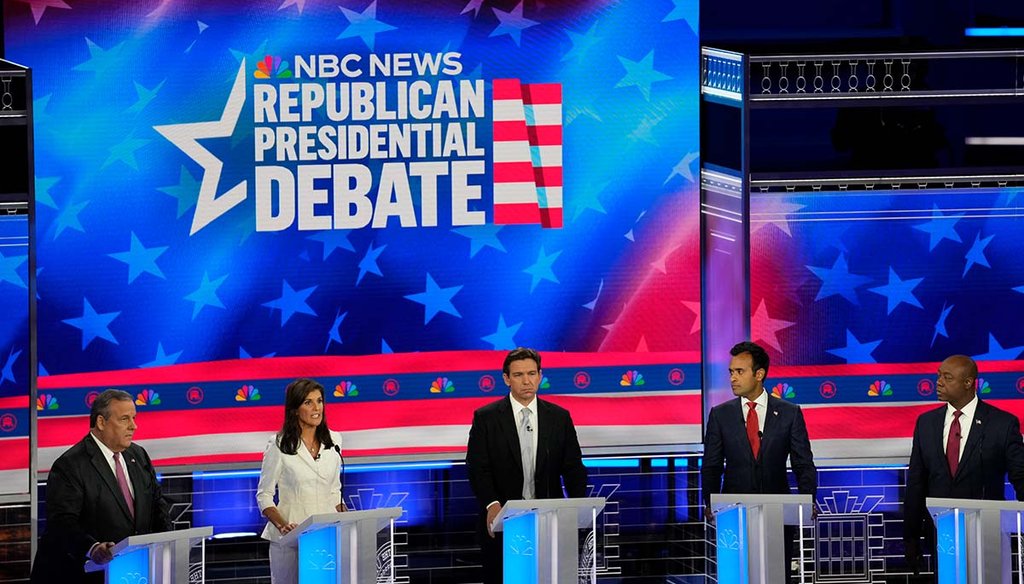Stand up for the facts!
Our only agenda is to publish the truth so you can be an informed participant in democracy.
We need your help.
I would like to contribute

Republican presidential candidates from left, Chris Christie, Nikki Haley, Ron DeSantis, Vivek Ramaswamy and Tim Scott, participate Nov. 8, 2023, in a debate at the Adrienne Arsht Center for the Performing Arts of Miami-Dade County in Miami. (AP)
MIAMI — President Joe Biden wasn't among the presidential candidates debating Nov. 8, but his foreign policy took center stage among the Republicans vying for their party’s nomination.
Gov. Ron DeSantis, R-Fla., called Biden’s evacuation efforts for Americans in Israel "atrocious." U.S. Sen. Tim Scott, R-S.C., said there was "blood dripping" from Biden and former President Barack Obama’s hands after they sent money to Iran. Entrepreneur Vivek Ramaswamy criticized spending American tax dollars to help Ukraine, saying the country is not a "paragon of democracy."
PolitiFact examined 21 claims from the debate. Here, we’ll focus on five exchanges on foreign policy that stood out and needed context.
DeSantis said he did more to rescue Americans stranded in Israel after Hamas attacked it than Biden did.
"I actually did something about it," DeSantis said. "Biden’s neglect has been atrocious. We had Floridians that were over there after the attack. He left them stranded. They couldn’t get flights out. So I scrambled resources in Florida. I sent planes over to Israel and I brought back over 700 people to safety."
Sign up for PolitiFact texts
DeSantis did do something about it. So did the Biden administration.
On Oct. 12, five days after the Hamas attack, the Biden administration said the U.S. government would arrange charter flights the next day so U.S. citizens and their immediate family members could depart Israel.
The federal government offered 6,900 seats by air, land and sea to Americans in Israel. Through Oct. 31, about 1,500 U.S. citizens and their family members had left Israel via federal government transport, a State Department spokesperson told PolitiFact.
DeSantis signed an Oct. 12 executive order allowing Florida to evacuate Americans from Israel. Approximately 700 Americans have flown from Israel to Florida on four flights, according to information reported Oct. 24 by DeSantis’ office.
DeSantis also said, "There could have been more hostages had we not acted." But by the time the DeSantis-chartered flights took place, Israel had already secured towns for days.
Hamas took about 240 hostages during the Oct. 7 attack. Israel secured towns in the area by Oct. 10. The first flight DeSantis offered landed in Tampa on Oct. 15.
Two of the former governors onstage, DeSantis and Nikki Haley, tore into the other’s efforts to recruit Chinese business to their state.
DeSantis accused Haley, a former United Nations ambassador, of having "welcomed" China into South Carolina, which she once governed, and giving them "land near a military base." He also said she wrote the Chinese ambassador "a love letter saying what a great friend they were."
DeSantis is right about the letter and the land. As South Carolina’s governor, Haley recruited multiple Chinese companies to the state, including fiberglass company China Jushi, which has connections to the Chinese Communist Party.
China Jushi was given land in Richland County, about 5 miles from the U.S. Army’s Fort Jackson training center.
According to its contract with Richland County, China Jushi would receive nearly 200 free acres of land as long as it made certain investments and created a certain number of jobs. If the obligations weren’t met, China Jushi had to pay back part of the land’s $4.9 million value.
Haley wrote to Chinese Ambassador Cui Tiankai in 2014 during her governorship, according to Fox News. Fox reported that the letter said, "We consider your country a friend and are grateful for your contributions on the economic front."
In turn, Haley attacked DeSantis’ government for also recruiting Chinese business.
"You have a company that is a manufacturer of Chinese military planes. They are expanding to training sites at two of your airports now, one which is 12 miles away from a naval base," she said.
This is accurate. In 2022, Cirrus Aircraft — a subsidiary of China’s Aviation Industry Corp. (AVIC) — opened two locations in Florida, one of which was at the Orlando Executive Airport, about 12.7 miles from the Naval Air Warfare Center Training Systems Division. AVIC manufactures planes, fighter jets and helicopters for the Chinese military.
Florida also had other contracts with Chinese companies through its former business-recruitment agency, Enterprise Florida, which DeSantis dissolved earlier this year.
Never Back Down, the super PAC supporting DeSantis, told PolitiFact that Cirrus came to Florida "of their own accord" under an anonymous project name. The Washington Post Fact Checker reported that it found no evidence that DeSantis recruited the company or gave it any state incentives.
Scott criticized Biden for a policy of "appeasement" toward Iran, which is both a major antagonist for U.S. foreign policy and a major supporter of Hamas in Gaza.
"I would tell President Biden with great clarity, ‘If you want to stop the 40-plus attacks on military personnel in the Middle East you have to strike in Iran,’" Scott said. "You cannot just continue to have strikes in Syria, on warehouses. You actually have to cut off the head of the snake, and the head of the snake is Iran and not simply their proxies."
Scott said, "President Biden has sent billions to Iran." This has been a common Republican talking point, but it’s misleading.
In August, the U.S. announced an agreement with Iran to secure freedom for five U.S. citizens who’d been detained in the country in exchange for letting Iran access $6 billion of its own funds that had been frozen in South Korean banks. The money consisted of Iranian oil revenue sequestered since 2019, when then-President Donald Trump banned Iranian oil exports and sanctioned Iran’s banking sector. (The $6 billion was not U.S. taxpayer money.)
Even before Hamas’ Oct. 7 attack, the agreement was politically divisive. But the White House has said that the money hasn’t been disbursed. And the deal required that Iran could access this money only to pay for humanitarian items, such as medicine and food.
Nevertheless, experts say money is fungible: Once you have money or expect to get it soon, you can spend it however you want.
Besides sparring over Israel and Hamas, the candidates criticized one another over another major world hot spot: Ukraine.
Ramaswamy has criticized U.S. support for Ukraine more than some of his rivals. After raising Ukraine’s efforts to restrict opposition parties in this debate and the last one, he brought up religion this time, too.
"Do you want to use U.S. taxpayer money to fund the banning of Christians? That is actually what’s happening. They’re using the Ukrainian Orthodox Church. They have banned them. The Ukrainian parliament just did this last week, supported by our dollars."
We found this needs context.
In October, Ukraine’s parliament took a step toward banning the Ukrainian Orthodox Church, though a ban has not been fully approved. The church was targeted for a ban because of alleged links to Russia, which invaded Ukraine in February 2022.
Most Ukrainian Christians belong to a different entity, the Orthodox Church of Ukraine, which was formed by a 2018 merger of two churches that have no Russian ties.
The Ukrainian Orthodox Church is the religious home of about 4% of the Ukrainian population, Reuters reported, citing data from the Kyiv International Institute of Sociology. The Ukrainian Orthodox Church opposes the proposed ban, arguing that it severed ties to Russia after the invasion. But a government commission ruled the church is still canonically linked to Russia, Reuters reported.
Hugh Hewitt, a conservative broadcaster who co-hosted the debate with NBC News, asked the candidates for their positions on U.S. naval capabilities.
He asked Haley, who served in Trump’s Cabinet, about Trump’s "goal" of "a 355 ship Navy. … It got to 300. it’s now at 291. Is that big enough to deter and if necessary, defeat an invasion of Taiwan?"
Haley agreed that this was a concern. "China has the largest naval fleet in the world," she said. "They have 350 ships, they’ll have 400 ships in two years, we won’t even have 350 ships in two decades."
Haley’s numbers were about right, though comparing ship counts doesn’t tell the full story.
The Pentagon’s 2022 China Military Power Report said that China’s navy had about 340 warships and is expected to grow to 400 in the next two years. The U.S. fleet is smaller than 300 ships, with a goal of 350 by 2045, according to the U.S. Navy’s Navigation Plan for 2022.
Naval ship counts have been a presidential campaign topic since 2012. As we noted in a fact-check then, ship counts sidestep other factors, including ships’ capabilities and advanced technologies the ships might deploy.
The nonpartisan Congressional Research Service has called ship counts "a one-dimensional measure."
Lance Janda, a Cameron University military historian, cautioned against exaggerating the comparison between the two countries.
"The U.S. Navy has greater tonnage by a pretty wide margin, which is a fancy way of saying we have more large vessels," Janda said. "The Chinese build a lot of smaller ships, and their fleet is still primarily a regional force. Ours is a true blue water navy capable of deploying anywhere in the world for an extended period, and we have many more aircraft carriers, far more naval aircraft, more advanced submarines and a larger Marine Corps."
Update, Nov. 9 at noon: We clarified that the Chinese company that manufactures military aircraft is the Aviation Industry Corp., not its subsidiary, Cirrus Aircraft. Cirrus specializes in manufacturing personal aviation.
Our Sources
See links in the story.
PolitiFact, "Fact-checking the third presidential debate in Miami," Nov. 8, 2023






































